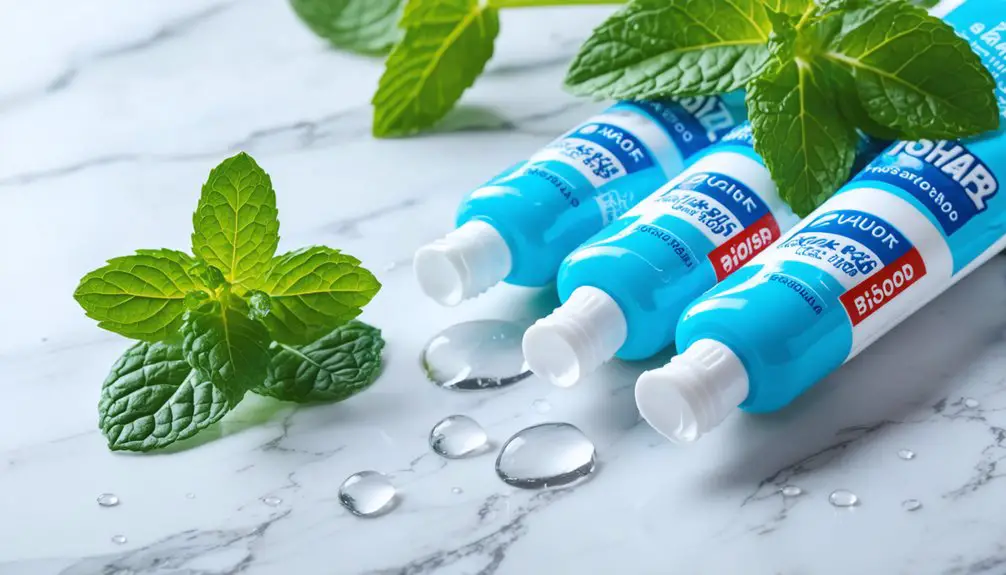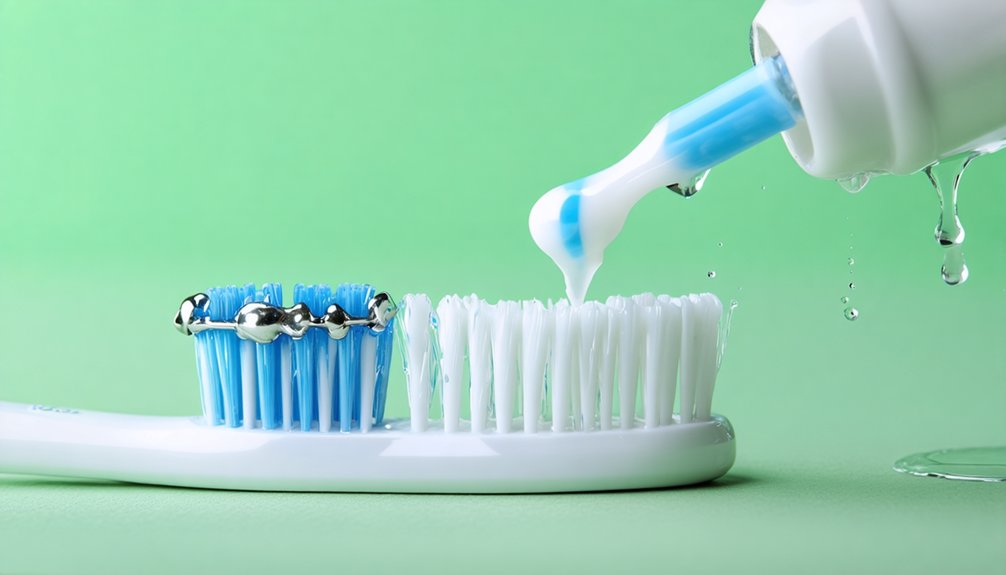You can achieve a brighter smile using toothpaste with gentle polishing agents like hydrated silica and calcium carbonate, which effectively remove stains without damaging enamel. Natural alternatives containing activated charcoal and plant-based compounds offer safer long-term care than harsh chemical whiteners. Choose formulations with RDA values below 70 and added fluoride to protect and strengthen your teeth. Understanding the role of essential minerals and herbal extracts will help optimize your oral care routine.
Key Takeaways
- Choose toothpaste with hydrated silica and calcium carbonate for gentle polishing that brightens teeth without damaging enamel.
- Look for RDA values below 70 to ensure safe daily use while effectively removing surface stains.
- Natural ingredients like activated charcoal provide gradual whitening through mild abrasion and stain adsorption.
- Fluoride and nano-hydroxyapatite strengthen enamel while contributing to a brighter, healthier smile.
- Plant-based antibacterial agents combat stain-causing bacteria while being gentle enough for sensitive teeth.
Understanding Gentle Brightening Ingredients
Five key ingredient categories work together to create effective yet gentle tooth-brightening formulations. When selecting a whitening toothpaste, you’ll find gentle ingredients like hydrated silica and calcium carbonate serving as primary polishing agents. These components remove surface stains while protecting your enamel’s integrity.
Silicon dioxide acts as a gentle polishing agent that smooths tooth surfaces without aggressive abrasion. Clinical testing has shown that noticeable whitening results appear within two weeks of daily use. If you’re considering natural options, activated charcoal can help adsorb stains through its mild abrasive properties. Optimized fluoride formulation helps strengthen and reharden enamel during the whitening process.
Each brightening ingredient is carefully balanced to maintain low abrasivity levels, ensuring you won’t experience increased sensitivity or enamel damage. By understanding these gentle ingredients, you can choose a whitening toothpaste that effectively brightens while prioritizing your patients’ long-term oral health.
Natural Vs Chemical Whitening Agents
While both natural and chemical whitening agents can brighten your smile, their mechanisms and effects differ markedly.
Chemical considerations include hydrogen peroxide and carbamide peroxide, which actively break down stains through oxidation, delivering faster results but potentially causing tooth sensitivity and enamel erosion. Additional ingredients like organic aloe vera help protect and soothe gums during the whitening process. Tom’s Simply White provides clinically proven whitening while maintaining a natural ingredient profile.
Chemical whitening agents offer rapid stain removal through oxidation but may compromise dental health with increased sensitivity and enamel damage.
Natural alternatives like hydrated silica, plant extracts, and enzymes work through gentle abrasion and antibacterial action. Though they require longer use for visible results, they’re less likely to cause sensitivity or damage your enamel.
Research shows that while chemical agents demonstrate superior short-term whitening, natural ingredients offer safer long-term care.
You’ll find that natural formulations also align with environmental consciousness through biodegradable ingredients and sustainable sourcing.
When choosing between options, consider balancing effectiveness with gentleness for ideal oral health.
The Power of Plant-Based Formulas
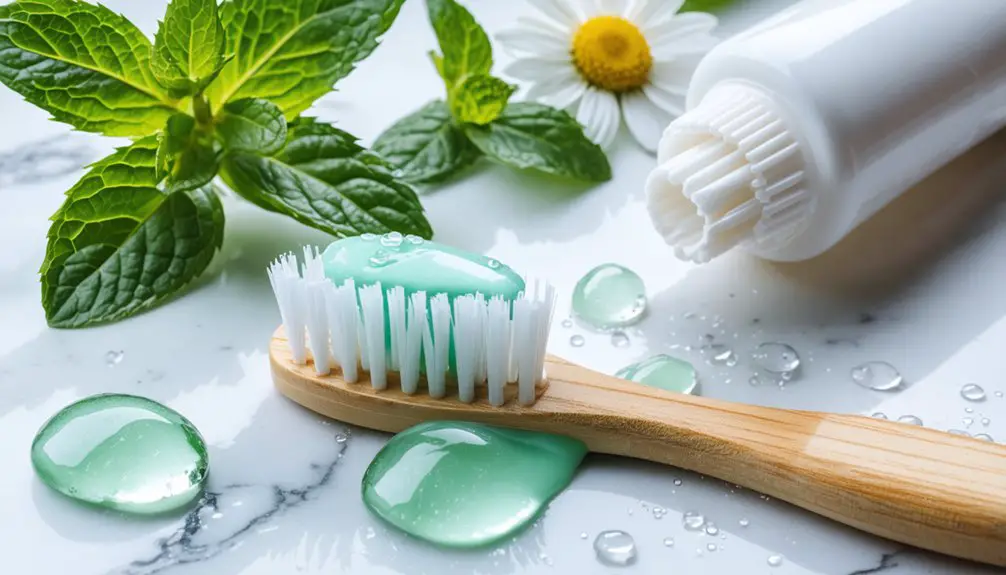
You’ll find nature’s most effective antibacterial agents, like neem and tea tree oil, working alongside soothing botanicals such as aloe vera and chamomile in plant-based formulas.
These natural ingredients combat harmful oral bacteria while supporting gum health and tissue repair without harsh chemicals or synthetic additives.
Studies show that natural toothpaste formulas deliver antimicrobial activity comparable to conventional brands.
Some users choose herbal toothpaste for its gentle cleansing properties that avoid enamel abrasion.
Plant-based toothpastes align with eco-conscious values, typically featuring sustainable packaging and cruelty-free production methods that minimize environmental impact.
Natural Antibacterial Properties
Plant-based formulations have revolutionized modern oral care through their potent natural antibacterial properties.
You’ll find powerful herbal antibacterial agents like neem, guava leaves, and cinnamon extracts targeting harmful bacteria such as Streptococcus mutans while maintaining your mouth’s delicate microbiome balance.
These natural ingredients work synergistically with essential oils, particularly Cinnamomum cassia, which can triple the antibacterial effectiveness of your toothpaste.
Unlike synthetic alternatives, plant-based formulations with baking soda and coconut oil act as a gentle natural mouthwash, reducing harmful bacteria while preserving beneficial oral flora.
You’re not just fighting cavities – you’re supporting a healthier oral ecosystem.
The combination of traditional herbs and essential oils provides extensive protection without the risks associated with synthetic antibacterial agents.
While natural formulations are gaining popularity, they may offer variable effectiveness compared to fluoride-based synthetic options in preventing tooth decay.
Eco-Friendly Oral Care
Beyond their antibacterial benefits, eco-friendly oral care formulations represent a significant advancement in sustainable dentistry. You’ll find these products eliminate harsh chemicals like sodium lauryl sulfate (SLS) and parabens, reducing your risk of oral tissue irritation and sensitivity. Parents can feel confident knowing these formulations are safe for children who may accidentally swallow toothpaste while brushing.
Plant-based formulations rely on natural alternatives, including coconut oil and aloe vera, to deliver effective cleansing without compromising oral health. Natural ingredients like xylitol and peppermint help fight cavities while providing fresh breath.
When you choose eco-friendly toothpaste with cruelty-free certification, you’re supporting brands that avoid animal testing and use renewable resources. These formulations typically feature sustainable packaging and environmentally conscious practices.
The inclusion of botanical minerals like calcium carbonate and bentonite clay provides gentle yet thorough cleaning, while plant-derived essential oils enhance your brushing experience with natural freshness and mild antibacterial properties.
Enamel Protection and Restoration
Understanding dental enamel protection is essential since tooth enamel, once damaged, can’t regenerate naturally.
However, you can combat enamel erosion through proven remineralization techniques and protective measures.
Modern dental science offers effective solutions for preserving and strengthening your enamel:
- Use specialized toothpaste containing nano-hydroxyapatite or fluoride to rebuild weakened enamel structure.
- Apply Zn-carbonate hydroxyapatite products to create a protective mineral coating.
- Minimize acidic food and beverage consumption to prevent further erosion.
- Incorporate calcium-rich foods into your diet to support natural remineralization.
Studies show that twice daily brushing with n-Ha toothpaste provides optimal protection and strengthening of tooth enamel.
Safe Abrasives for Daily Cleaning
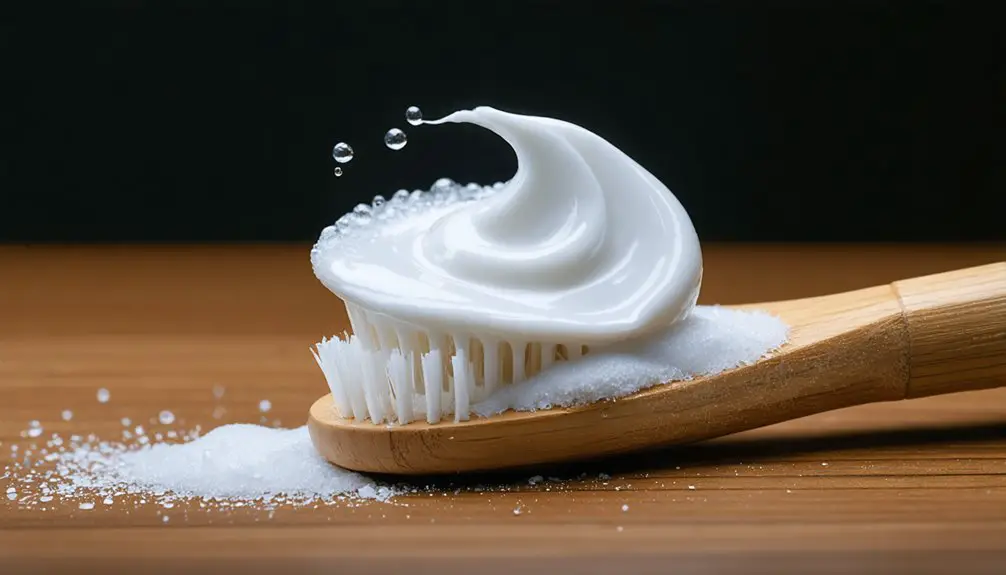
Your toothpaste’s abrasiveness level directly impacts your enamel’s long-term health, with RDA values below 70 considered safe for daily use.
When choosing between common abrasives, hydrated silica and calcium phosphate offer effective cleaning while maintaining gentler RDA values compared to calcium carbonate’s more aggressive action.
You’ll find ideal protection for your teeth by selecting toothpastes that list mild abrasives like sodium bicarbonate (RDA 7) or enzyme-based cleaning agents rather than harsh mineral compounds.
Understanding Abrasive Levels
The science of tooth cleaning hinges on a important measurement called Relative Dentin Abrasivity (RDA), which determines how aggressively a toothpaste scrubs your teeth.
Understanding RDA values is essential for proper toothpaste selection and protecting your enamel’s long-term health.
When evaluating abrasive testing results, you’ll find RDA values correspond to specific safety levels:
- RDA 0-70: Safe for daily use, providing gentle polishing without damaging dentin
- RDA 70-100: Medium abrasiveness, suitable for occasional use but may cause wear
- RDA 100-150: High abrasiveness, risking enamel erosion with regular use
- RDA 150+: Harmful levels that can cause permanent enamel damage
Choose toothpaste with RDA values below 70 for daily brushing, as these formulations effectively clean while preserving your enamel’s integrity.
Calcium Carbonate Vs Silica
Dental professionals frequently debate the merits of calcium carbonate versus silica as primary abrasives in toothpaste formulations. While both ingredients effectively clean teeth, they differ considerably in their impact on your enamel.
Calcium carbonate features smaller particles but can be more aggressive due to its crystalline structure, typically comprising 38-42% of toothpaste formulas.
Silica abrasiveness tends to be higher, with RDA values around 70, compared to calcium carbonate’s generally lower scores. However, silica’s larger particles and consistent form make it particularly effective at removing plaque and stains.
You’ll want to take into account that both abrasives can increase enamel wear, especially after acid exposure. For ideal dental health, choose ADA-approved toothpastes that maintain RDA values under 250, regardless of which abrasive they contain.
Essential Minerals and Fluoride Benefits
Modern dental science has established fluoride as a cornerstone mineral for maintaining ideal oral health, working synergistically with calcium and phosphate to strengthen tooth enamel.
Fluoride’s powerful partnership with calcium and phosphate creates an essential foundation for strong, healthy teeth and optimal dental protection.
This mineral synergy creates a powerful defense system that actively repairs and protects your teeth.
You’ll experience these essential fluoride benefits through four key mechanisms:
- Remineralization of weakened enamel through mineral replacement
- Formation of an acid-resistant protective barrier on tooth surfaces
- Inhibition of harmful bacterial growth in your mouth
- Enhancement of calcium and phosphate absorption into tooth structure
When you use fluoride toothpaste regularly, you’re not just cleaning your teeth – you’re actively participating in a scientifically proven process that strengthens enamel, prevents decay, and maintains long-term oral health through optimal mineral interaction.
Herbal Extracts for Gum Health
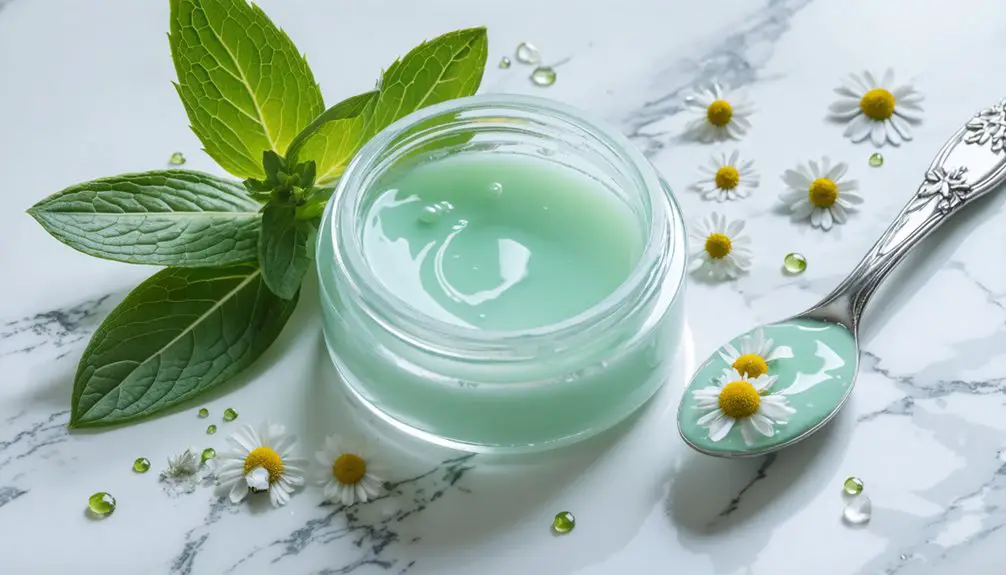
Natural herbal extracts deliver powerful therapeutic benefits for gum health through four primary mechanisms: anti-inflammatory action, antimicrobial properties, tissue regeneration, and reduced side effects compared to synthetic alternatives.
When you’re looking to support your patients’ oral health, herbal infusions like chamomile and tea tree oil effectively reduce gingival inflammation through compounds such as apigenin. These botanicals work by inhibiting inflammatory enzymes while combating periodontal pathogens.
Plants like neem, holy basil, and guava provide broad-spectrum antimicrobial protection without risking bacterial resistance. For gum rejuvenation, these extracts stimulate tissue repair and improve circulation while reducing oxidative stress.
Unlike synthetic antimicrobials such as chlorhexidine, which can trigger allergic reactions, herbal treatments typically offer gentler care with fewer adverse effects.
Balancing Effectiveness With Sensitivity
When managing tooth sensitivity, finding the right balance between effectiveness and comfort requires understanding the distinct mechanisms of various active ingredients.
Your sensitivity management options range from fast-acting arginine compounds to gradual nerve-blocking potassium nitrate, each offering unique benefits for ingredient efficacy.
For ideal sensitivity control while maintaining oral health, consider these clinically proven approaches:
- Choose stannous fluoride formulations for dual sensitivity relief and gentle whitening.
- Use arginine-calcium carbonate combinations for rapid tubule sealing.
- Select potassium nitrate products for long-term nerve desensitization.
- Opt for mild-flavored formulations to guarantee consistent daily use.
You’ll achieve better results by matching the active ingredient to your specific sensitivity needs while maintaining regular use of your chosen product.
Frequently Asked Questions
How Long Should I Wait After Eating Before Brushing With Whitening Toothpaste?
Wait 1-2 hours after eating before using whitening toothpaste to protect your enamel health. Proper brushing techniques during this window help prevent sensitivity and enamel damage when pores are vulnerable.
Can Gentle Whitening Toothpaste Remove Coffee Stains From Dental Veneers?
Want to tackle those coffee stains on your veneers? You’ll find gentle whitening toothpaste offers limited stain removal on veneer surfaces, as their non-porous material responds differently than natural teeth to whitening agents.
Is It Safe to Use Whitening Toothpaste While Wearing Braces?
While you can use gentle whitening toothpaste with braces, it won’t effectively whiten under brackets, risking uneven results. For ideal braces care, choose non-abrasive fluoride toothpaste and maintain thorough hygiene instead.
Should Children Use Gentle Whitening Toothpaste Before Losing All Baby Teeth?
Like delicate flower petals, baby teeth shouldn’t face harsh whitening agents. You’ll want to avoid whitening toothpaste due to tooth development concerns. Focus on proper dental hygiene tips until permanent teeth emerge.
How Often Should Gentle Whitening Toothpaste Be Replaced After Opening?
You’ll need to replace your whitening toothpaste within two years of opening, regardless of the product expiration date, as toothpaste shelf life diminishes once exposed to air and moisture.
References
- https://pmc.ncbi.nlm.nih.gov/articles/PMC9585602/
- https://emergencydentalofomaha.com/5-benefits-to-plant-based-toothpastes/
- https://news.uthscsa.edu/study-shows-toothpaste-with-artificial-enamel-ingredient-restores-enamel-is-more-effective-than-fluoride-2/
- https://rockfamilydental.com/the-science-behind-toothpaste-ingredients-and-their-effects/
- https://biadentalcenter.com/articles/en/445/a-scientific-exploration-of-toothpaste-ingredients:-beyond-the-basics
- https://www.jordanoralcare.com/products/green-clean-gentle-whitening-toothpaste/
- https://www.fairwaymarket.com/product/sensodyne-pronamel-gentle-whitening-toothpaste-40-oz-id-00310158850007
- https://beauty.chanhtuoi.com/sensodyne-gentle-whitening-en.html
- https://incidecoder.com/products/sensodyne-gentle-whitening
- https://incidecoder.com/products/colgate-gentle-whitening

